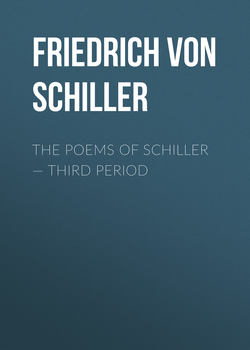Читать книгу The Poems of Schiller — Third period - Фридрих Шиллер, Friedrich von Schiller - Страница 14
POEMS OF THE THIRD PERIOD THE FOUR AGES OF THE WORLD
ОглавлениеThe goblet is sparkling with purpled-tinged wine,
Bright glistens the eye of each guest,
When into the hall comes the Minstrel divine,
To the good he now brings what is best;
For when from Elysium is absent the lyre,
No joy can the banquet of nectar inspire.
He is blessed by the gods, with an intellect clear,
That mirrors the world as it glides;
He has seen all that ever has taken place here,
And all that the future still hides.
He sat in the god's secret councils of old
And heard the command for each thing to unfold.
He opens in splendor, with gladness and mirth,
That life which was hid from our eyes;
Adorns as a temple the dwelling of earth,
That the Muse has bestowed as his prize,
No roof is so humble, no hut is so low,
But he with divinities bids it o'erflow.
And as the inventive descendant of Zeus,
On the unadorned round of the shield,
With knowledge divine could, reflected, produce
Earth, sea, and the star's shining field, —
So he, on the moments, as onward they roll,
The image can stamp of the infinite whole.
From the earliest age of the world he has come,
When nations rejoiced in their prime;
A wanderer glad, he has still found a home
With every race through all time.
Four ages of man in his lifetime have died,
And the place they once held by the fifth is supplied.
Saturnus first governed, with fatherly smile,
Each day then resembled the last;
Then flourished the shepherds, a race without guile
Their bliss by no care was o'ercast,
They loved, — and no other employment they had,
And earth gave her treasures with willingness glad.
Then labor came next, and the conflict began
With monsters and beasts famed in song;
And heroes upstarted, as rulers of man,
And the weak sought the aid of the strong.
And strife o'er the field of Scamander now reigned,
But beauty the god of the world still remained.
At length from the conflict bright victory sprang,
And gentleness blossomed from might;
In heavenly chorus the Muses then sang,
And figures divine saw the light; —
The age that acknowledged sweet phantasy's sway
Can never return, it has fleeted away.
The gods from their seats in the heavens were hurled,
And their pillars of glory o'erthrown;
And the Son of the Virgin appeared in the world
For the sins of mankind to atone.
The fugitive lusts of the sense were suppressed,
And man now first grappled with thought in his breast.
Each vain and voluptuous charm vanished now,
Wherein the young world took delight;
The monk and the nun made of penance a vow,
And the tourney was sought by the knight.
Though the aspect of life was now dreary and wild,
Yet love remained ever both lovely and mild.
An altar of holiness, free from all stain,
The Muses in silence upreared;
And all that was noble and worthy, again
In woman's chaste bosom appeared;
The bright flame of song was soon kindled anew
By the minstrel's soft lays, and his love pure and true.
And so, in a gentle and ne'er-changing band,
Let woman and minstrel unite;
They weave and they fashion, with hand joined to hand,
The girdle of beauty and right.
When love blends with music, in unison sweet,
The lustre of life's youthful days ne'er can fleet.
